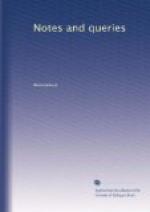When your correspondent complains, therefore, that in “Hen. IV. Part 2,” Act III. sc. 1., in the line,
“With deafening clamours in the slippery clouds,”
the word shrouds is not substituted by editors of Shakespeare for “clouds,” the answer is, that not a single old copy warrants the merely fanciful emendation, and that it is not at all required by the sense of the passage. In the 4to of 1600, and in the folio of 1623, the word is “clouds;” and he must be a very bold editor (in my opinion little capable of doing justice to any author), who would substitute his own imaginary improvement, for what we have every reason to believe is the genuine text. Shrouds instead of “clouds” is a merely imaginary improvement, supported by no authority, and (as, indeed, your correspondent shows) without the merit of originality. I am for the text of Shakespeare as he left it, and as we find it in the most authentic representations of his mind and meaning.
J. PAYNE COLLIER.
* * * * *
MEDAL OF THE PRETENDER.
Sir,—Possibly some one of your literary correspondents, who may be versed in the, what D’Israeli would call Secret History of the Jacobite Court, will endeavour to answer a “Query” relative to the following rare medal:—
Obv. A ship of war bearing the French flag; on the shore a figure in the dress of a Jesuit (supposed to represent Father Petre) seated astride of a Lobster, holding in his arms the young Prince of Wales, who has a little windmill on his head. Legend: “Allons mon Prince, nous sommes en bon chemin.” In the exergue, “Jacc: Franc: Eduard, suppose. 20 Juin, 1688.”
Rev. A shield charged with a windmill, and surmounted by a Jesuit’s bonnet; two rows of Beads or Rosaries, for an order or collar, within which we read “Honny soit qui non y pense;” a Lobster is suspended from the collar as a badge. Legend: “Les Armes et l’Ordre du pretendu Prince de Galles.”
The difficulty in the above medal is the Lobster, though doubtless it had an allusion to some topic or scandal of the day; whoever can elucidate it will render good service to Medallic History, for hitherto it has baffled all commentators and collectors of medals. The windmill (indicative of the poplar fable that the Prince was the son of a miller), and the Roman Catholic symbols, are well understood.




